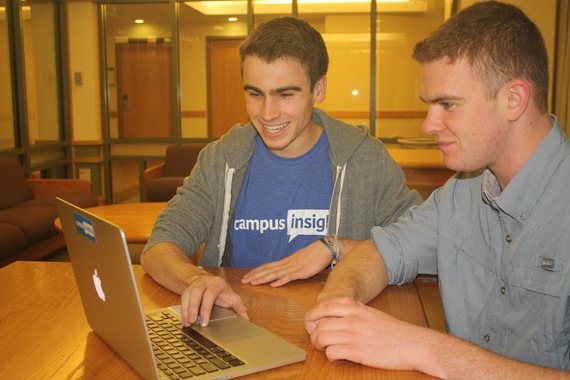Riley Soward (left), a sophomore at Boston College and founder of Campus Insights. He is wearing his brand t-shirt, of course!
Co-authored with Brian Rashid
Riley Soward is a sophomore at Boston College and a founder of Campus Insights, a startup that assists companies with UX/UI testing and marketing research among college student users. Riley is warm, energetic and a constant learner; he might be just starting out, but he was just selected as one of Boston's top 25 founders under 25.
Now to some of us it feels like everyone on campus is selling their startup to Google, and you are there on your couch eating ramen noodles. You must be wondering: is it real? How do you start a career in startups? Most importantly, how do you do it?
Want to dominate the innovation economy like Riley? Let's see how you can start.
1. Define your Interests
Riley grew up near Silicon Valley and always loved testing new products. In high school he devised a clever part-time job hack: he'd be going to the office of a new company, use their products, and offer feedback. The entire startup team would surround him to listen to his opinion; he met lots of different founders and felt pride for coming up with ways to improve their products. In October 2014, he came to Boston College and realized how he could amplify his ability to give feedback to companies by interviewing ten, or twenty students across the nation. Campus Insights was born - and soon found its first client, but more on that later.
James Altucher, a serial entrepreneur that started 20 companies (!), recommends continuously generating ideas in his TEDx talk : '"Give your ideas 10x. Come up with 10x ideas for companies, for people, and start sharing these ideas with no expectation of them sharing back with you. However, one out of 50, one out of a 100, will get back to you. They'd get back to me for sure!" James recommends developing a habit of generating ideas and thinking how these ideas might be similar and connect into a bigger concept for a startup.
2. Cultivate Relationships
A good idea isn't enough; to scale his project, Riley started taking initiative to reach to others for help, acquiring mentors, sales, introductions, and partners on his venture. He started reaching out to faculty members at Boston College for feedback and support. He spoke with Prof. Gallaugher at Boston College, who teaches an introductory freshman class in computers and management; Prof. Gallaugher has been instrumental to Riley's success. Riley stopped by his office hours to mention his interest in startups; Prof. Gallaugher promptly connected him to to BC alumni, who ultimately helped Riley get his first paying client, delivered feedback on his idea, and even provided connections with venture capital firms.
Remember, faculty want to help! Riley says, "Look, you are at a college; professors are at a college because they want to benefit and teach and mentor students. In the end of the day, professors are there to help students." Professors can be helpful far beyond the academic world - they often have valuable connections in the business and academic world, or the alumni network; a science/engineering professor can provide guidance with technical aspects or might even end up serving as an advisor to your future startup.
3. Start Somewhere!
When I asked Riley about his advice to young entrepreneurs who want to start their own ventures, he shared that one of his philosophies is, "you have to start somewhere!" Often, people are too paralyzed by trying to decide what path to take, or trying to make the absolute best decision at every given moment. Over time, however, Riley and his cofounder, Stephen, learned that they could always correct and refine their ideas. Now, Riley consistently reaches out to other Silicon Valley founders at work to ask questions about every aspect of their business and learn about the process of sales, marketing, and product creation, and continues to learn.
What drives Riley to move forward with Campus Insights? "I love the core idea - soliciting feedback from college students and making sure their voices are heard. Even though we are so early, we must persuade other people that our teammates are absolute superstars; that our product deserves it. I owe it all to the idea, and of course to the team."
Brian Rashid, who consults startups and writes for Forbes, thinks the number one reason startups can grow their businesses is building a system for reaching out.
If you are an entrepreneur, the key is to let people know what you are doing. I get call after call from potential clients who are going out of business and ask for help. I always ask them the same first question: "How many people did you reach out to today to make a sale or inform people about your product, service or idea?" I am shocked at the number of times the answer is, "Uh, none." Start selling today if you want to be in business tomorrow!
Ramen noodles are fine for a while. We've all been there. But eventually, they get soggy and too salty. Eventually, you want something else. You want to get off the couch. You want to play in the game.
Get started, and let us know your story in the comments! What are you planning to do to break into the innovation economy? We'll reach out to the top commenters to interview them for future stories.
Thanks for Tudor Guirgica-Tiron for feedback on this article.

